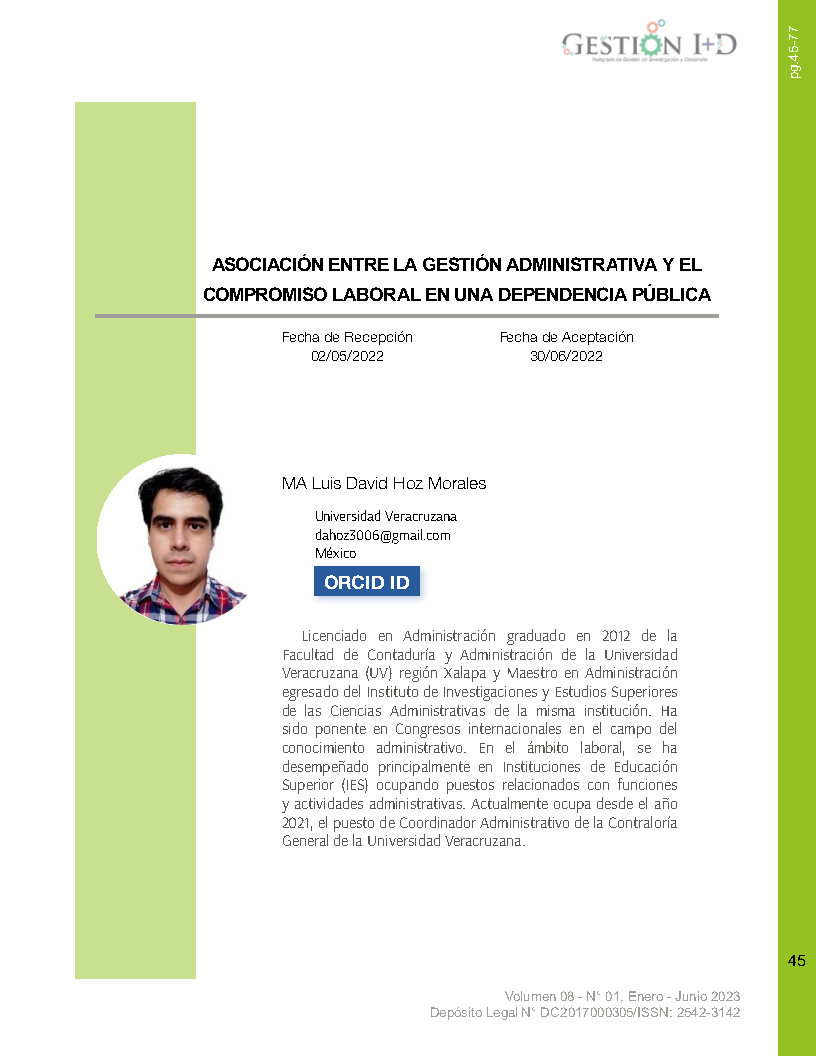Asociación entre la gestión administrativa y el compromiso laboral en una dependencia pública
Palabras clave:
gestión, administración, compromiso organizacional, dependencia públicaResumen
El Compromiso Organizacional se considera una actitud de los colaboradores deseable para toda organización. La falta de compromiso puede llevarlos a una actitud de indiferencia en sus resultados laborales. Por otra parte, quien realiza la Gestión Administrativa puede incurrir en prácticas o implementar políticas que podrían ser percibidas de manera negativa por los colaboradores de la organización afectando con ello el compromiso que tengan con la misma. En este trabajo, se tuvo el objetivo de determinar si existía una asociación entre el Compromiso Organizacional de los colaboradores de una dependencia pública y la percepción que tienen sobre la Gestión Administrativa. Se utilizó un enfoque cuantitativo, no experimental, transversal, con alcance relacional. Se usó la encuesta, mediante un cuestionario conformado por 54 ítems, 7 concernientes a datos generales del encuestado, y 47 con cuatro opciones de respuesta ordinal tipo Likert, correspondientes a las variables y sus dimensiones. Se recopiló la información mediante censo de 52 trabajadores administrativos. Se encontró una percepción favorable en casi todas las dimensiones de la Gestión Administrativa estudiadas, identificándose áreas de oportunidad de mejora tales como reconocimiento al desempeño, igualdad de condiciones laborales y comunicación. El compromiso afectivo fue el de mayor presencia en los colaboradores. Se determinó a través del coeficiente de correlación de Spearman, la existencia de asociación bilateral positiva y significativa entre el Compromiso Organizacional y la percepción de la Gestión Administrativa, comprobando con ello, la hipótesis planteada en este trabajo de investigación.
Descargas
Citas
Claure Rocha, M., & Böhrt Pelaez, M. R. (marzo de 2004). Tres dimensiones del compromiso organizacional: identificación, membresía y lealtad. Ajayu, 2(1). http://www.scielo.org.bo/scielo.php?pid=S2077-21612004000100008&script=sci_abstract
Coronado-Guzmán, G., Valdivia-Velasco, M., Aguilera-Dávila, A., & Alvarado-Carrillo, A. (2020). Compromiso Organizacional: Antecedentes y Consecuencias. Conciencia Tecnológica(60), 1-14. https://www.redalyc.org/journal/944/94465715006/html/
Edel Navarro, R., García Santillán, A., & Casiano Bustamante, R. (2007). Clima y Compromiso Organizacional. https://www.eumed.net/libros-gratis/2007c/340/indice.htm
Fernández Mesa, A., Llopis Córcoles, Ó., García Granero, A., Olmos Peñuela, J., & Martínez Sanchis, P. (2017). Dime cómo eres y entenderé por qué te vas. Universia Business Review(55), 80-117. https://dialnet.unirioja.es/servlet/articulo?codigo=6161893
Gallardo Gallardo, E. (2008). Evolución en el estudio y medida del compromiso organizativo. Problemáticas y Soluciones. XXII Congreso Anual de AEDEM "Building Bridges in a Global Economy". Salamanca, España: Academia Europea de Dirección y Economía de Empresa. https://www.researchgate.net/publication/285153355_EVOLUCION_EN_EL_ESTUDIO_Y_MEDIDA_DEL_COMPROMISO_ORGANIZATIVO_PROBLEMATICAS_Y_SOLUCIONES
Garzón Rodríguez, C. M. (2011). Análisis de los conceptos de administración, gestión y gerencia en enfermería, desde la producción científica de enfermería, en América Latina (Tesis de Maestría). Bogotá, Colombia: Universidad Nacional de Colombia. http://bdigital.unal.edu.co/6678/1/claramariagarzonrodriguez.2011.pdf
Guzmán Fernández, C., Ancona Alcocer, M., & García Muñoz Aparicio, C. (2014). El compromiso organizacional en profesores investigadores de una universidad pública mexicana. XIV Asamblea General de la Asociación Latinoamericana de Facultades y Escuelas de Contaduría y Administración. Panamá, Panamá. http://www.alafec.unam.mx/docs/asambleas/xiv/ponencias/10.08.pdf
Manzano Mier, M. (2006). Introducción a la percepción. La Habana, Cuba: Editorial Félix Varela. https://elibro.net/es/ereader/bibliotecauv/71808
Münch Galindo, L. (2015). Manejo del proceso administrativo. México: Pearson Educación. https://elibro.net/es/ereader/bibliotecauv/38000
Robbins, S. P. (2004). Comportamiento organizacional (10a ed.). Naucalpan de Juárez, Estado de México: Pearson Educación. https://elibro.net/es/ereader/bibliotecauv/107669
Sampieri Hernández, R., Fernández Collado, C., & Baptista Lucio, M. d. (2010). Metodología de la investigación (5a ed.). México, D.F.: McGraw-Hill. https://www.icmujeres.gob.mx/wp-content/uploads/2020/05/Sampieri.Met.Inv.pdf
Suárez, L. (9 de agosto de 2013). Employee engagement is about human relationships, not human resources. (A. Swinscoe, Entrevistador) https://www.adrianswinscoe.com/2013/08/employee-engagement-is-about-human-relationships-not-human-resources-interview-with-luis-suarez-of-ibm/




